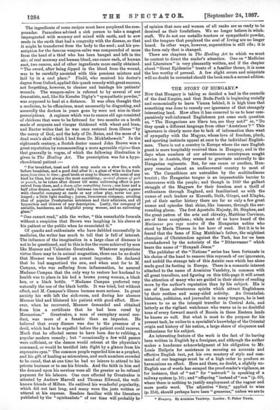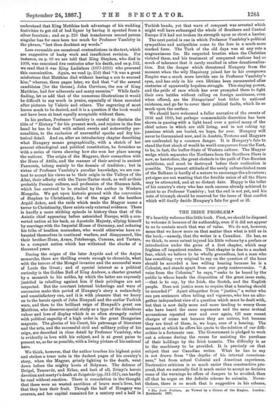THE STORY OF HUNGARY.*
Now that Hungary is taking no decided a lead in the councils of the dual Empire, and that Buda-l'esth is beginning socially and economically to leave Vienna behind, it is high time that something was done to remedy our ignorance of that strangely interesting land. How often it has occurred to us to hear com- paratively well-informed Englishmen put some such question as, "The Hungarians are Slave too, are they not ?" or, "Do they speak a different language from other 'Austrians " This ignorance is clearly more due to lack of information than want of sympathy with the Magyar, whose love of freedom, pluck, and sporting instincts appeal at once to the individual English- man. There is not a country in Europe where the rare English guest is more hospitably received than in Hungary, and in the days when numbers of our adventurous countrymen sought service in Austria, they seemed to gravitate naturally to the Hungarian regiments. Bat, for one cause or another, Hun- gary remains almost an undiscovered country to most of us. The Carpathians are untrodden by the multitudinous tourist ; the Hungarian tongue is an impenetrable barrier to intercourse with the people ; and though in 1849 the gallant struggle of the Magyars for their freedom sent a thrill of enthusiasm through England, and familiarised us with the names of such leaders as Kossuth, Detik, Corgei, and Klapka, yet of their earlier history there are for us only a few great names and episodes that shine, like beacons, through the sur- rounding gloom. The first Apostolic Majesty, St. Stephen, and the great patron of the arts and chivalry, Matthias Corvinus, are of these exceptions ; while most of us have heard of the Moriamur pro rege nosfro of the Hungarian nobles who stood by Maria Theresa in her hour of need. But it is to be feared that the fame of King Matthias's father, the mightiest champion of Christendom against the Turk, has for -us been overshadowed by the notoriety of the " Bitterwasser " which bears the name of "Hunyadi Jinos."
The publisher of the "Nations" series has been fortunate in his choice of the hand to remove this reproach of our ignorance, and unfold the strange tale of this Asiatic race which has alone made good its footing in Europe. There is a romantic interest attached to the name of Arminins Vambfiry, in common with all great travellers, and figuring on this title-page it will arrest the attention of many who are guided in their choice of reading more by the author's reputation than by his subject. His is one of those adventurous spirits which attract Englishmen by their restless and many-sided activity. An Orientalist, historian, politician, and journalist in many tongues, he is best known to us as the intrepid traveller in Central Asia, and latterly as the vigilant watchman who warns us in no doubtful tone of every forward march of Russia in those Eastern lands be knows so well. But what is most to the purpose for his present task, he unites to a specialist's knowledge of the Oriental origin and history of his nation, a large share of eloquence and enthusiasm for his subject.
An interesting feature of the work is the fact of its having been written in English by a foreigner, and although the author makes a handsome acknowledgment of his obligation to Mr. Louis Heilprin for assistance in securing an accurate and effective English text, yet his own mastery of style and com- mand of our language mast be of a high order to produce so harmonious an effect. Here and there, no doubt, a slightly un- English use of words has escaped the proof-reader's vigilance, as for instance, that of " net " for " network " in speaking of a railway system (p.16); and" offspring " instead of " son " (p. 60), where there is nothing to justify employment of the vaguer and more poetic word. The adjective "fiery," applied to wine (p. 254), should perhaps have been " generous," unless we are to
• Hungary. By Armtek, Vamlutry. London T. Fisher Haydn.
understand that King Matthias took advantage of his wedding festivities to get rid of bad liquor by having it spouted from a silver fountain ; and on p. 226 that treacherous second person singular has for once been too much for Professor Vambdry in the phrase, "lest thou donbteat my words."
Less excusable are occasional contradictions in the text, which are suggestive of hasty work and insufficient revision. For instance, on p. 96 we are told that King Stephen, who died in 1038, was canonised five centuries after his death, and on p.112, we read that it was King Ladislaus (1077-1095) who procured this canonisation. Again, we read (p. 256) that "it was a great misfortune that Matthias died without leaving a son to succeed him," whereas, three pages later, we find that "of the several candidates [for the throne], John Corvinus, the son of King Matthias, had few adherents and many enemies." While fault- finding, let us add that of the numerous illustrations it would
be difficult to say much in praise, especially of those executed after pictures by Valerie and others. The engraving of most leaves much to be desired, and it is a question if the book would not have been at least equally acceptable without them.
In his preface, Professor Vambdry is careful to disclaim the title of " History" for his present work, and rejoices in the free hand he has to deal with salient events and noteworthy per- sonalities, to the exclusion of uneventful epochs and dry his- torical detail. And so, after an introductory chapter describing what Hungary means geographically, with a sketch of her present ethnological and political constitution, he furnishes us with a series of views showing how she won her place among the nations. The origin of the Magyars, their connection with the Huns of Attila, and the manner of their arrival in ancient Pannonia, belong mainly to the domain of tradition ; but in virtue of Professor Vambiry's peculiar knowledge, we are con- tent to accept his views as to their origin in the Valleys of the Altai, their affinity with the Turco-Tartar stock, as well as their probably Persian culture, and profession of the Shaman faith, which has survived to be studied by the author in Western Mongolia. We get upon historic ground with the conversion of Stephen to Christianity, for of the reign of the heathen Arpad dukes, and the raids which made the Magyar name a terror to Christianity, there exists only external evidence. There is hardly a more striking episode in history than that of the Asiatic chief appearing before astonished Europe, with a con- verted nation at his back, as Apostolic Majesty, allying himself by marriage with the Imperial House of Germany, and reducing his tribe of heathen marauders, who would otherwise have ex- hausted themselves in continual warfare, and disappeared, like their brother-Huns, Avers, Petchenegs, Cumane, and Tartars, to a compact nation which has withstood the shocks of a thousand years.
During the reigns of the later Arpids and of the Anjou monarchs, there are thrilling events enough to chronicle, what
with the terrors of the Mongol invasion and the successful wars of Louis the Great ; and of special interest as a political curiosity is the Golden Bull of King Andrew, a charter granted
by a monarch to his nobles, by which the latter are expressly
justified in rebelling against him if their privileges are not respected. But the constant internal bickeringe and wars of succession make this period of Hungary's story a melancholy and unsatisfactory one, and it is with pleasure that we hurry on to the heroic epoch of John Hunyadi and the earlier Turkish wars, and then to the brilliant reign of Hunyadi's great son Matthias, who deserves special study as a type of the chivalrous valour and love of display which is so often strangely united with political sagacity of a high order in the great Hungarian magnate. The glories of his Court, his patronage of literature and the arts, and the successful civil and military policy of his reign, are described in close detail by Professor Vambdry, who is evidently in love with his subject, and is at great pains to present us, as far as possible, with a living picture of his national hero.
We think, however, that the author touches his highest point and strikes a truer note in the darkest pages of his country's story, when the Magyar, grimly fighting to the death, went down before the mighty hosts of Solyman. The defence of
Drdgel, Temesvir, and Edam, and best of all, Zrinyi's heroic devotion and martyr's death at Szigetvfir (pp. 311.317), can hardly be read without emotion. There is consolation in the thought that these were no wasted sacrifices of brave men's lives, but that they bore their fruit. Though the half of Hungary was overran, and her capital remained for a century and a half in
Turkish hands, yet that wave of conquest was arrested which might well have submerged the whole of Southern and Central Europe if it had not broken its strength upon so stout a barrier.
The next period is one in which Professor Vamb6ry's political sympathies and antipathies come to the fore in a much more marked form. The Turk of the old days was at any rate a magnanimous foe. He respected treaties when the Christian violated them, and his treatment of conquered nations had so much of tolerance that it rarely resulted in utter denationalisa- tion. But the danger which threatened Hungary from the moment when the wily Hapsburg joined her to his overgrown Empire was a much more terrible one in Professor Vamb6ry's eyes, and has only in his own lifetime been surmounted after centuries of apparently hopeless struggle. This staying power, and the pride of race which has ever prompted them to fight their own battles without calling on foreign assistance, even when offered, are the Hungarians' best titles to national existence, and go far to cover their political faults, which lie so much upon the surface.
We should have welcomed a faller narrative of the events of 1848 and 1849, but perhaps commendable discretion has been shown in passing with a light hand over a period many of the chief actors in which are still living, and in not raking up passions which are buried, we hope, for ever. Hungary will never be Germanised now, and in Austria, Teutons and Magyars are confronted by a common danger. It is Hungary's fate to stand the first shock of would-be world-conquerors from the East, to be, in fact, the buffer-State of Western culture. The Magyar wedge which separates the Northern from the Southern Slave is now, as heretofore, the great obstacle in the path of Pan-Russian ambitions, and must be destroyed before their realisation is possible. The present attitude of the newly enfranchiehed races of the Balkans is hardly of a nature to encourage the adventure; yet signs are not wanting that the forcible union of all the Slays may be attempted, and at no distant date. Happy is the teller of his country's story who has such success already achieved to point to as Professor Vamb6ry ; but the end is not yet, and his note of triumph should be reserved for the issue of that conflict which will finally decide Hungary's fate for good or ill.



































 Previous page
Previous page